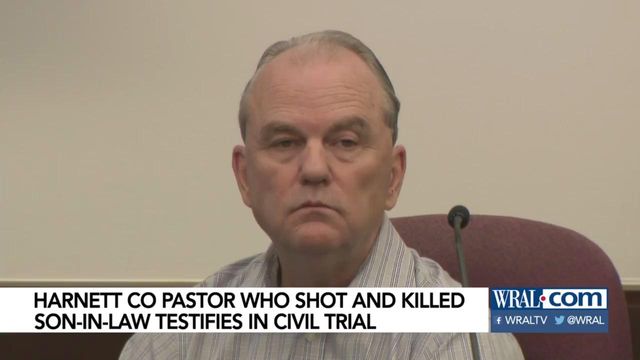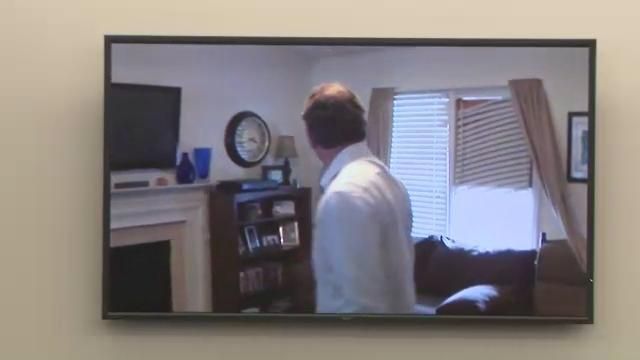Angier pastor takes stand in wrongful death suit over son-in-law's killing
The Angier pastor facing a wrongful death lawsuit over the shooting of his son-in-law took the stand in the civil trial Thursday, telling a Harnett County jury he didn't remember much from the incident at his Angier home in 2013.
Pat Chisenhall, the pastor at the Abundant Life Worship Center in Angier, shot and killed 23-year-old Christian Griggs on Oct. 12, 2013. Chisenhall has said he shot his son-in-law in self-defense as Griggs was attempting to break into his home, and was fearful for both his and his daughter's lives.
Griggs' parents dispute that claim, and in 2015 filed a wrongful-death lawsuit that argues Chisenhall is civilly liable for the shooting. They said their son arrived at the Chisenhall homestead that day to pick up his 4-year-old daughter for scheduled visitation.
The case was the subject of a WRAL News investigation published and aired last week.
Since the shooting, Chisenhall has been diagnosed with post-traumatic stress disorder and said he does not remember firing six shots from his .22-caliber semiautomatic rifle at Griggs, hitting him once in the stomach, once in the shoulder and four times in the back.
He told a Harnett County jury Thursday that he had a deep relationship with Griggs and had baptized him three weeks before the shooting, although he said things had become strained in the months before Griggs' death.
"It was a father-son kind of thing," Chisenhall said. "I think he felt the same way."
But he said he has no memory of the shooting after seeing glass break in on the front window of his home that morning in October 2013. And under questioning from the Griggs family's attorney, Robert Jessup, he said his lack of memory meant he couldn't testify that he fired the shots in self defense, defense of his daughter or in defense of his home.
Chisenhall's lawyer has argued that he is protected by North Carolina's Castle Doctrine, which allows lawful occupants of homes, workplaces and vehicles to defend themselves.
Video shows shooting re-enactment
Shortly after the shooting in 2013, Chisenhall performed a re-enactment for Harnett County sheriff's deputies, which they captured on video as evidence during the investigation.
Jessup played that video in its entirety for the jury Thursday, as Chisenhall sat on the stand.
In it, Chisenhall told deputies that Griggs had arrived at his property on Oct. 12, 2013. He said Griggs became enraged after he was told his estranged wife had obtained a restraining order against him and he had to leave.
Court records show there was no restraining order against Griggs, but his wife had sworn out several misdemeanor warrants for an incident at the property the night before. Chisenhall testified Thursday that he had been mistaken.
In the video re-enactment, Chisenhall said he told his daughter Katie, then Griggs' estranged wife, to retreat into the house and lock the door. He says Christian pushed him back a few steps, threatened to beat him up and ran around the house, banging on doors and windows to get Katie to come out.
"I've never seen a rage like that in my life," Chisenhall told deputies in the video.
He said he retreated into the house after calling 911, struggling along with his daughter to close the door as Griggs pushed on the other side. Then, he said, glass in the front window shattered inward, and he heard his son-in-law threaten to kill him.
In the video, he said he remembered grabbing his Winchester rifle from a hallway closet and believed he shot Griggs from behind a couch, about 10 to 12 feet away from the double-hung front window, which was pushed open at the top.
Parts of the incident, he said in the video, he couldn't remember clearly, but he said he was scared for both himself and his daughter.
Shortly after the shooting, he was involuntarily committed to Holly Hill Hospital, a psychiatric facility in Raleigh.
On the stand Thursday, Chisenhall said the video did nothing to refresh his memory of the shooting – or the even the re-enactment itself.
"It was like seeing that for the first time," Chisenhall told jurors.
He said he can no longer describe his or Griggs' position or remember any threats. He said he couldn't explain why there were no bullet holes or blood stains found on the curtains, blinds, window frame, glass or furniture.
Jessup asked if Chisenhall thought it was possible he walked out the front door and shot Griggs on the porch.
"I have no memory of it," Chisenhall said. "I cannot imagine that."
On cross-examination later, he said he does vividly remember his daughter Katie's reaction once they had retreated back into the house shortly before the shooting.
"That's an image that's frozen in my mind, the sheer terror," Chisenhall told jurors. "I've never seen it before."
Tension at home
Chisenhall also told jurors he was aware of several cases where Griggs' actions had disturbed him, including an incident he said took place during the summer of 2013.
Chisenhall said he saw Christian walk into the woods behind his estranged wife's house. The pastor said he found his son-in-law sitting against a tree with a handgun and photos of Katie and their daughter, Jaden. Griggs talked about not wanting to live without them, and taking them all out together, Chisenhall said. The pastor talked him down and convinced him to give up the gun.
Under questioning from Jessup, the Griggs family's lawyer, Chisenhall said he didn't report the incident to police and voiced no objections to his son-in-law moving back in later with his daughter and granddaughter at the house he owned next door. Chisenhall said he thought he only told his wife about the incident, and that Griggs didn't want treatment.
"He refused to go," Chisenhall said. "He said I'm not going to go anywhere."
Chisenhall later returned the weapon.
He also told jurors that before the day of the shooting, he had never seen Griggs be physically abusive.
Before he stepped down for the afternoon, Chisenhall testified that he loved Griggs, and thought his son-in-law loved him too. He broke down in tears while reading letters Griggs sent him from Iraq, presented by his attorney. In them, his son-in-law said the pastor had "truly made a difference in my life."
But Chisenhall said he learned there were two sides to his son-in-law.
"There was a great, great side. But he was also a very troubled young man," Chisenhall said. "I tried very hard to help him."
CSI detective details scene
The plaintiffs also called retired Harnett County Sheriff Detective Hal Stroud, the crime scene investigator who arrived at Pat Chisenhall's home shortly after the shooting.
Stroud shot photos of the exterior and interior of the home and noted that the sashes of the front window were separated and pushed into the home. The glass on the bottom was intact but the top was shattered, he said.
At the scene, he said he was informed that Chisenhall told investigators he shot Griggs from behind a couch while his son-in-law was coming through that window. Viewing an enlarged photo of the living room of the house from about where Chisenhall said he was standing, Stroud said he examined the entirety of the living room, including furniture, vents, blinds curtains and the frame of the window.
"I could find no evidence of bullet holes in anything in this area," Stroud said.
He also found no trace of blood on the window or in the house, and could recover no fingerprints from the glass, frame or a screen that was torn out and thrown on the hedge in front of the outside porch.
Stroud told the jury he looked for six shell casings after he was told Christian Griggs was shot six times. But he could only find three of them, clustered together behind a chair in the living room. That search included the grounds and vegetation outside.
"Since there was activity on the porch when I arrived, I was trying to cover all my bases," Stroud said.
A subsequent search by other officers also did not locate the other three casings.
Stroud said he couldn't recall any other investigation he'd worked on where shell cases where missing from the scene. But he said without firing the weapon, he couldn't say whether it was normal that the casings were clustered together.
"I've seen them grouped together and I've seen them separated by four or five feet," Stroud said.
His testimony will continue Friday morning when the court resumes session.
Father steps down
Thursday's earliest testimony was the continued cross-examination of Tony Griggs, who found his son shot and dying on Chisenhall's front porch.
Much as he did the day before, defense attorney Robert Levin challenged Griggs' recollections of what he told law enforcement in interviews after the shooting, compared to testimony this week.
Griggs said he didn't remember telling law enforcement that his son had been despondent at one point over losing a job or, during another interview, that he was "upset, disgruntled" the night before he was shot. He said he gave a lot of interviews with investigators and tried to cooperate to the best of his abilities.
"It was a very chaotic, confusing and tumultuous time when my son was killed," Griggs said.
Tony Griggs also disputed descriptions in a police report from December 2008 following an altercation between him and his son at their home that there had been any physical contact between them or that he had to be subdued by police.
Wednesday also saw testimony from Associate Chief Medical Examiner Lauren Scott, who performed the autopsy on Christian Griggs.
She told the jury that the trajectory of the four shots to Griggs' back – which entered at upward angles – meant that the upper half of Griggs body would have to be almost parallel to the ground. That's assuming the shooter was in a standing position, she said.
She testified that she had seen no evidence to suggest Chisenhall was crouching when he fired the shots.
The civil trial is expected to last through early next week with testimony from some two-dozen witnesses.
CORRECTION: Due to an editing error, a previous version of this story incorrectly reported that the Rev. Pat Chisenhall was voluntarily committed to psychiatric care. He was involuntarily committed, evidence showed.












